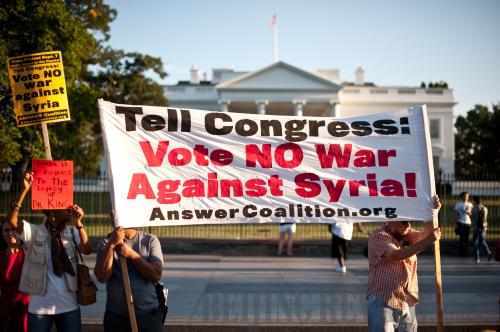Obama's war
- By Ding Ying
 0 Comment(s)
0 Comment(s) Print
Print E-mail Beijing Review, September 10, 2013
E-mail Beijing Review, September 10, 2013
The Middle East is once again in the center of chaos as of late August. U.S. President Barack Obama, who won a Nobel Peace Prize in 2009, has been intent on launching a military strike against Syria since August 28 and has sought authorization from Congress before taking military action.
 |
|
Activists demonstrate against U.S. intervention in Syria in front of the White House in Washington D.C. on September 3 [Beijing Review] |
A hard decision
The White House sent Congress a draft resolution on August 31 seeking approval of a military strike in order to "deter, disrupt, prevent and degrade the potential" for future use of chemical weapons or other weapons of mass destruction in Syria. It promised that military action will be "limited" and will not involve sending U.S. troops to Syria. Obama's decision was aimed at punishing Bashar al-Assad's Government for the alleged August 21 use of chemical weapons on its citizens. On August 21, a chemical weapon attack hit the suburbs of Damascus, the Syrian capital, reportedly killing at least 1,429 people, including 426 children. The Syrian Government denied responsibility. But Obama, in spite of the Syrian Government's protests, insisted on using military force.
One year ago, Obama warned the Syrian Government against using chemical weapons, calling it a "red line" that Washington would use to conduct a military attack.
"Obama's accusation against the Syrian Government is untenable. There's no concrete evidence proving which side in Syria had used chemical weapons. What can be confirmed now is only existence of chemical weapons in Syria," Liu Yueqin, a senior research fellow on Syrian studies with the Chinese Academy of Social Sciences (CASS), said to Beijing Review. She pointed out that without the UN Chemical Weapons Inspection Team's investigation report, such accusation is not creditable.
"China's position is clear-cut. China is firmly opposed to the use of chemical weapons by any party in Syria," said Hong Lei, spokesman of Chinese Ministry of Foreign Affairs, in August. He affirmed China's support for the UN Secretariat in carrying out an independent, objective, impartial and professional investigation on the alleged use of chemical weapons in accordance with UN resolutions. Hong urged all sides not to make prejudgments before the truth is uncovered.
Jia Xiudong, a senior research fellow at the China Institute of International Studies (CIIS), believed that the United States has already decided and long been preparing for military intervention, including guiding public opinions through the media. Now the White House believes it has caught the Assad administration red-handed.
Syria's crisis has lasted over two years, during which time many humanitarian disasters have occurred in the country. Why have Western countries decided to launch a military strike on the Assad administration now?
"Recent changes in the regional situation and the U.S. geostrategic interests drove Washington in the direction of military intervention," Liu concluded.
She explained that since June, fresh crisis in Egypt had directed the world focus away from Syria. During the past two months, Syrian government troops had regained many occupied cities from the opposition, greatly shifting the country's balance of power. Liu stressed that the Syrian opposition's connection with Al Qaeda previously prevented Washington from launching military intervention in support of the opposition. "As government troops have regained advantages in the country, Washington would rather launch a military strike now," said Liu. "The current situation proves that if there's not external intervention, Syria actually has the ability to heal and put an end to the crisis."






Go to Forum >>0 Comment(s)